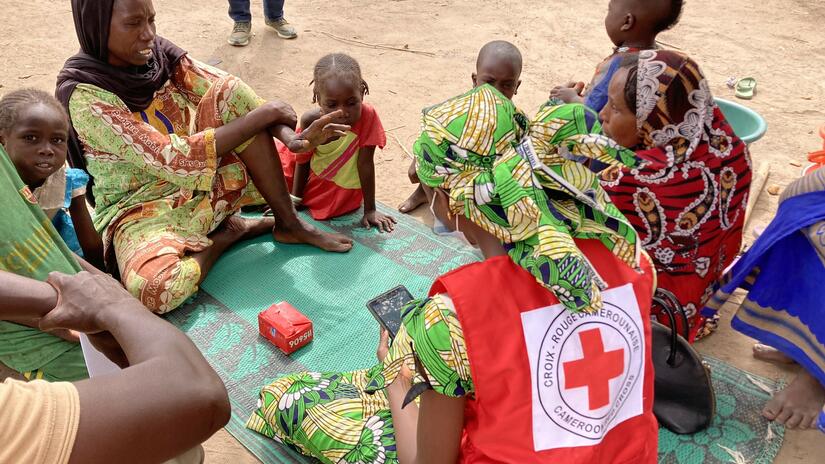"My name is Madi, and I am a mother of 12 children.
My family had always lived in Maga peacefully alongside other ethnic groups, even if from time to time there were tensions.
I never imagined that one day we would have to leave.
One evening as my children and I were already in bed, my husband hurriedly came in and urged me to wake them up. More tensions had flared up. But this time houses were being burnt, people were being killed, livestock were being robbed. To save our lives, we had to leave.
He asked me to take the few things we could carry with us and we set off immediately. To what destination, I did not know. But the screaming and shouting I heard near our house convinced me that we needed to move quickly.
We walked with our children day and night across the savannah, resting here and there to regain our strength. Hundreds of us fled that night with the few personal belongings we could grab in a hurry. By the grace of God, we were able to find refuge in the locality of Bogo, about 45km from Maga, where the host population greeted us with food and drink.
Tented camps for internally displaced persons (IDPs) were soon set up by humanitarian workers. Some people from our community were with us in our camp, while others were placed elsewhere, miles away. But what mattered was that we could finally rest, sleep peacefully with our children, and allow them to recover from long days of walking.

Cameroon Red Cross volunteers conduct post-distribution assessments in the BOGO IDP camp. IDPs have been supported by the Cameroon Red Cross with DREF funding from the IFRC
Photo: Muriel Atsama / IFRC
Once we settled, we were visited by several humanitarian organizations, including the Cameroon Red Cross. Volunteers went from shelter to shelter to see how we were doing. They taught us how to keep our shelters clean and how to prevent diseases such as cholera and COVID-19. But most importantly, they listened to us when we talked about the hardships we had been through and all the loved ones we had lost back in Maga.
A few weeks later, we received basic items from the Cameroon Red Cross. The volunteers handed out buckets, cooking pots, blankets, soap, and dignity kits to enable our girls to take care of their personal hygiene. We are extremely grateful for this support, but unfortunately it is not enough.
When we lived in Maga, my husband had an income, we could meet our daily needs. But now that we have lost everything and are far from the land we’re familiar with, we lack food.
Access to drinking water is a difficult journey. We have to walk up to 7km to find a water point, which is very difficult without our donkeys to help us.
Our children have not been to school since the crisis. And at night we share our shelter with many others because there is not enough space.
We are grateful to receive weekly visits from nurses who come to see our children, vaccinate them, and give us treatments for diseases. And we hope to receive further assistance from the Cameroon Red Cross Society.
For the moment, we do not plan to return to Maga. The after-effects of the crisis are too fresh in our minds and the tension has not yet subsided. We want to stay here for now because we are safe. But we need support."
-------------
The Cameroon Red Cross, with DREF support, has provided household items, water, hygiene supplies and dignity kits to 299 households in Bogo and Pette, in addition to running awareness campaigns on disease prevention and peace culture. We are currently considering how we can best provide further assistance to communities—potentially through cash assistance.
Speaking about the response, IFRC Regional Disaster Management Coordinator, Josuane Tene, said "At this stage, the needs identified are multifaceted. The shelters provided by humanitarian partners are not sufficient. Many of them are makeshift shelters and with the rainy season approaching, which is usually very severe in this part of the country, those affected need safe shelters. They also struggle to feed themselves properly. Cash assistance and livelihood support will certainly help them to meet their needs with dignity."
The IFRC’s Disaster Response Emergency Fund (DREF) is a central pot of money through which we can quickly release money to National Societies—enabling them to prepare for, and respond to, small and medium-sized disasters like the conflict in northern Cameroon. You can donate to the DREF today to support people just like Madi.
The IFRC also provides country support to the Cameroon Red Cross, and other National Societies in the region, through our Cluster Delegation based in Yaoundé, Cameroon. You can learn about this work in our cluster support plan for 2022.

